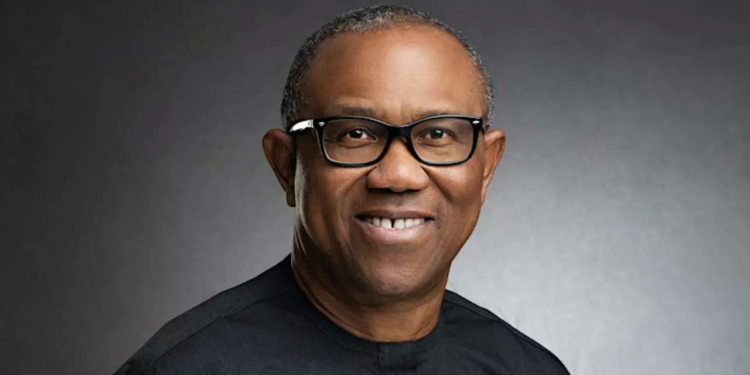Former national chairman of the Inter Party Advisory Council, (IPAC), Chief Peter Ameh, has said the presidential candidate of the Labour Party in 2023, Peter Obi, should be the rally point of the opposition coalition against the reelection of President Bola Tinubu.
Using the Independent National Electoral Commission (INEC) data from the 2023 presidential election, Ameh said results from the election revealed a political landscape reshaped by Peter Obi, whose remarkable performance underscored his unique appeal and electoral strength.
Ameh, in a statement, said the data showed Obi’s ability to challenge entrenched political giants like APC’s Bola Tinubu and PDP’s Atiku Abubakar, even without the backing of a robust political machine.
“His results after deduction by rigging, particularly in Southern Nigeria, and his competitive showing in the North, highlight a singular force in Nigerian politics—one whose inclusion is critical to any coalition aiming for success. In Southern Nigeria, Obi’s dominance was undeniable. He secured 44.5% of the vote share, decisively outperforming Tinubu at 35.5%, Atiku at 19.4%, and Rabiu Kwankwaso at a mere 0.46%,” he said.
He said this commanding lead in the South illustrates Obi’s ability to resonate with voters in a region critical to electoral success, adding that his performance was not just a victory; it was a statement of his capacity to mobilize and inspire without relying on traditional political structures.
“He did the same with APGA in Anambra when he defeated the entrenched PDP establishment structure to become Governor,” he added.
Still relying on the INEC, data, Chief noted that in Northern Nigeria, the dynamics shifted, “with Tinubu leading at 38.9%, followed closely by Atiku at 35.2%. Obi, with 15.2%, trailed behind, while Kwankwaso garnered 10.9%. While Obi did not dominate the North, his 15.2% vote share is notable given his lack of entrenched regional influence. More critically, the Northern results expose Atiku’s vulnerability. Had Atiku defeated Tinubu in the North, as Obi did in the South, Tinubu would not be president today. Atiku’s inability to secure a decisive victory in a region where he has contested for decades underscores his electoral weakness and overreliance on the People’s Democratic Party (PDP) machinery.”
He noted that Atiku’s campaign leaned heavily on the PDP’s formidable structure, which included 13 governors, 38 senators, 122 House of Representatives members and countless houses of assembly members. “Yet, despite this arsenal, Atiku secured roughly 6 million votes—remarkably, the same total as Obi. Obi achieved this figure without a single governor, senator, or representative in his corner. This parity in votes, despite the obvious contrast in resources, is a testament to Obi’s individual appeal and grassroots momentum. Atiku’s performance, by contrast, highlights his dependence on the PDP’s entrenched network, raising questions about his ability to inspire voters independently,” he said.
The statement reads in part, “The data paints a clear picture: Peter Obi is a singular force in Nigerian politics. His 6 million votes, secured without party backing or political godfathers, reflect a groundswell of support that transcends traditional structures. Obi’s ability to match Atiku’s tally while operating as a political outsider underscores his unique electoral impact.
“Meanwhile, Atiku’s failure to dominate the North, despite years of contesting and a robust political machine, reveals his limitations. Obi’s message of production, economic revitalization, and good governance resonated with millions of Nigerians, fueling his extraordinary electoral performance. His vision of a productive Nigeria, coupled with his ability to connect with voters on a personal level, galvanized support across diverse demographics, particularly in the South, where he dominated, and even in the North, where he secured a respectable share. This widespread appeal, achieved without the crutches of political machinery, solidifies Obi’s status as a transformative figure whose influence is driven by ideas rather than institutional power.
“The implications for future coalitions are clear. Obi’s acceptance as the torchbearer for the opposition is not just beneficial but essential for any alliance aiming to challenge the status quo. His proven ability to mobilize voters, particularly in the South, and compete respectably in the North, positions him as a linchpin for electoral success. Atiku’s reliance on PDP structures, coupled with his inability to secure a regional stronghold, suggests that his influence is waning. The coalition’s path to victory hinges far more on Obi’s dynamic appeal than on Atiku’s traditional clout.
“This is my final thought as we look forward to opposition consensus ahead 2027 general elections, Peter Obi’s 2023 electoral performance was a masterclass in defying the odds. The data—44.5% in the South, 15.2% in the North, and 6 million votes without a political machine despite all the rigging and stolen votes —demonstrates his unparalleled impact. Had Atiku mirrored Obi’s regional dominance, the presidency might have eluded Tinubu. Obi’s rise, fueled by a message of production and governance that resonated with millions, signals a new era in Nigerian politics, one where individual charisma and voter connection can rival, and even surpass, the might of established political dynasties. For any coalition to succeed, Peter Obi is not just an asset; he is indispensable,” he said.



